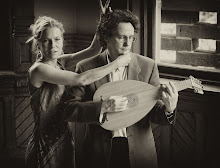This is a picture of Mary Sidney, the Countess of Pembroke (done by Nicholas Hilliard). On Thursday we were at the Jackman Humanities Bldg. doing some singing, talking and playing about her Psalm paraphrases and metrical Psalm singing in general in the Elizabethan and Jacobean times for Prof. Katie Larson. We discussed the place of Psalm singing in the culture and the politics at the time and then got onto singing some.
We started out by singing some of the Sternhold and Hopkins versifications of the Psalms to the 'old church tunes'. Many of these tunes were pinched from the Genevan Psalter and German choral repertoire. These translations of the Psalms were the most common way you would hear the Psalms sung in English churches for hundreds of years. Some of the words have a simple dignity, but some are pretty bad doggerel. From the Ten Commandments:
Yield honour to thy parents, that
Prolonged thy days might be
Upon the land, the which the Lord
Thy God hath given thee.
Thou shalt not murther, Thou shalt not
Commit adultery.
Thou shalt not steale. Nor witness false
Against thy neighbour be.
From Richard Allison's publication of 1599 we sang the 23rd Psalm (My shepherd is the living Lord) to the tune now associated with 'While shepherds watched their flocks'. The tune was associated with sheep, then, for a hundred years before Purcell librettist Nahum Tate wrote the Christmassy words. Then we sang the Nunc Dimittis from the same book. You can hear us sing that here and buy it on a CD here. Or you can get the whole thing on itunes at this link.
(Since first writing this I have been reminded that we didn't actually sing this Nunc, but decided on the fly to sing the two settings of Psalm 23 back to back and then didn't go back to this. But you get the idea anyway.)
Allison gives the old church tune in the soprano part, with a lute accompaniment under it, with an optional cittern part, and parts for alto, tenor and bass, printed on the page so the performers can sitted around a table.
So while they might have been sung in these harmonisations in church this publication clearly imagines it as domestic music. Ravenscroft's Psalms from slightly later have the melody in the tenor part and are printed so that the book could be put on a stand and sung by a small choir.
At the end of the 16th century the great and the good realised that the Sternhold and Hopkins versions of the Psalms weren't always the best poetry, so they started having a go at them themselves. Sir Philip Sidney started to translate them, and when he was killed fighting the Spanish, his sister Mary set about completing them. We sang the two settings of her Psalms that have survived, Ps. 51 and Ps. 130. These have more irregular line lengths than the S&H paraphrases, so can't be interchangebly set to any old hymn tune. The rhythm of the tune that sets the Sidney version is still very syllabic and hymn like, but the tune leaps around more and is more interesting than the old church tunes. There is lots of musical interest in the lute parts in these settings, and I was much busier than Hallie. (They are pretty hard to play.)
We also sang Thomas Campion's Ps.130, which has verses of three lines each (again, it wouldn't fit to a regualr hymn tune). Though his lute part is not so virtuosic as the anonymous settings of the Sidneys, his has more harmonic intrest and chromatic movement.
We also sang George Herbert's paraphrase of Psalm 23 set to music by Henry Lawes. This proto-Baroque setting has Lawes following the rhythm of speech with a continuo accompaniment for the lute. Sometimes (o the horror of creeping influence from Catholic countries) there are slidy expressive bits in the voice part, and even two notes on one syllable!
And we finished off with two settings of free sacred texts. Campion's 'Author of Light' has greasy chromatic movement at words like 'mists and darkness' and expressive leaps in the voice. John Dowland's setting of 'If that a sinner's sighs be angels food' has a decadent lute introduction and uses madrigalisms like a rest before the word 'sigh'. (these hearty *gasp* sighs and woefull plaints). Composers obviously felt more at liberty when they weren't setting biblical texts.




No comments:
Post a Comment